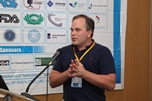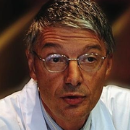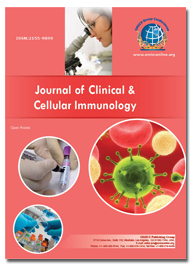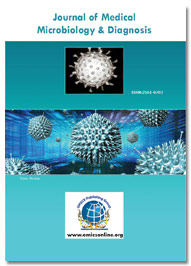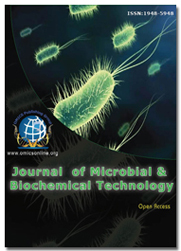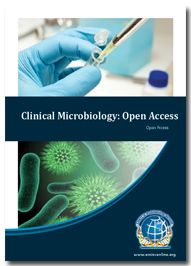Theme: Clinical Microbiology: The place and the contribution to clinical field
Clinical Microbiology 2017
After the success of Clinical Microbiology 2012, Clinical Microbiology 2013 and with the tremendous response of Clinical Microbiology 2014 and Clinical Microbiology 2015 and Clinical Microbiology 2016 in October ,ConferenceSeries Ltd is glad to announce 8th International conference on Clinical Microbiology during October 26-28, 2017 at Paris, France.
ConferenceSeries Ltd Organises 300 International Conferences Every Year across USA, Europe & Asia with support from 1000 more scientific societies and Publishes 500+ Open access journals which contains over 50000 eminent personalities, 50,000 reputed scientists as editorial board members and 5 million readers.
This meeting will focus in particular on the most current research related to the laboratory diagnosis of human and animal infections and the role of the laboratory in both the management of infectious diseases and the elucidation of the epidemiology of infections, the latest developments in clinical microbiology and immunology, providing the current state of knowledge in the field, as well as balanced, thought-provoking perspectives on controversial issues.
Why to attend?
- Best platform to develop new partnership & collaborations.
- Best location to speed up your route into every territory in the World.
- 89% our conference attendees are the Key contact in their labs purchasing decisions.
- Our exhibitor booths were visited 4-5 times by 80% of the attendees during the conference.
- Past exhibitor’s feedback reveals ample of enquiries perceived from the conference attendees.
- Network development with both Academia and Business.
Target Audience:
We invite experts in the field of clinical microbiology including bacteriologist, virologist, molecular microbiologist, infection and quality control clinicians, exercise physicians, yoga practitioners, veterinary microbiologist and delegates from industries focusing on microbiology, molecular genomics and industrialist involved in biomedical research as well.
Microbiology-2017 ardently encourages patrons, benefactors, pioneers, and exhibitors from across the world to convene you all to attend and register for the “8th Clinical Microbiology Conference (Clinical Microbiology 2017) which is going to be venerated from October 26-28, 2017 at Paris, France.
The organizing committee is endowing for a rather stimulating and illuminative conference programs subsuming Plenary Lectures, Symposia, Workshops on a myriad of topics, Poster Presentations and an assortment of programs for participants from over the globe. We invite you to accompany us at the 8th Clinical Microbiology-2017, where you are assured to have a substantially worthwhile experience with ecumenical scholars. All the representatives of Clinical Microbiology-2017 organizing committee look forward to meet you at the congregation at Paris, France.
Microbial pathogens embody microorganism, viruses, fungi, and parasites and along account for a major proportion of acute and chronic human diseases. Additionally to understanding the mechanisms by that varied pathogens cause human un wellness, analysis in microbic pathological process additionally addresses mechanisms of antimicrobial resistance and also the development of latest antimicrobial agents and vaccines. It covers biology, host-pathogen interaction and medicine associated with infectious agents, as well as microorganism, fungi, viruses and protozoa. microbic pathological process is committed to the study of the genomic, molecular and cellular bases of clinical infectious diseases
Related Microbiology Conferences | Clinical Microbiology Conferences | ConferenceSeries Ltd
World Congress on Mycotoxins February 27-28, 2017 Amsterdam, Netherlands, 9th International Virology Congress and Expo March 13-15, 2017 London, UK, 10th World Congress on Virology and Mycology May 11-12, 2017 Singapore, International Conference On Microbial Engineering May 29-31, 2017 Beijing, China, Global Pharmaceutical Microbiology Conference June 19-20, 2017 London, UK, International Conference on Fungal Diseases & Control September 25-26, 2017 Dubai, UAE, 7th Annual Congress on Clinical Microbiology August 28-30, 2017 Philadelphia, USA.
Nosocomial Infection comprises infection which is struck from the hospital surroundings, staff, in-patients/out-patients, cleaners and other healthcare centers. These infections can be contracted in any of the health-care departments like- the Hospital environment or the Nursing Home, Rehabilitation Centers or other Clinical settings. Nosocomial Infections are relayed to the pre-disposed in such environments by an innumerable ways. Various Health care personnel can spread different infections via contaminated equipment, Soiled/unclean/non-disinfected bed linens and other clothes, blankets, pillows, or air droplets. These infections can spread either from outside of the hospital, from in-patient, staff that may be infected, or carriers, unknown sources. In most of the pathogenic microorganisms originate from the patient's own skin flora, also called as opportunistic microbes; after any surgical process or those procedures that compromises skin as the primary protective barrier. Albeit, the patient contracts the infection privy from their skin, the infection are considered to be nosocomial since it emanates in the hospital.
Related Microbiology Conferences | Clinical Microbiology Conferences | ConferenceSeries Ltd
World Congress on Mycotoxins February 27-28, 2017 Amsterdam, Netherlands, 9th International Virology Congress and Expo March 13-15, 2017 London, UK, 10th World Congress on Virology and Mycology May 11-12, 2017 Singapore, International Conference On Microbial Engineering May 29-31, 2017 Beijing, China, Global Pharmaceutical Microbiology Conference June 19-20, 2017 London, UK, International Conference on Fungal Diseases & Control September 25-26, 2017 Dubai, UAE, 7th Annual Congress on Clinical Microbiology August 28-30, 2017 Philadelphia, USA.
The analysis of the molecular and cellular viscera constituting the immune system, subsuming their function and interaction, is the pivotal science of immunology. Autoimmune diseases are an expansive spectrum of analogous diseases in which the immune system produces an erroneous retroaction against privy cells, tissues and/or organs, ensuing inflammation and damage. There are furthermore 80 different autoimmune diseases ranging from commonly prevalent to very discreet diseases. Cell-based immunotherapies are validated to be competent for some cancers. Immune effector cells for instance, Macrophages, Lymphocytes, Natural Killer cells (NK Cell), Dendritic cells, Cytotoxic T Lymphocytes (CTL) etc., work collectively to shield the body against cancer by directing the encounter on deviant antigens expressed superficially on the tumor owing to mutation. Allergies and sensitivities have augmented exorbitantly in the recent interim — Acute, Chronic and Subclinical Allergies have been intensified so radically that estimates are that over 60 million Americans have various allergies and few more millions suffer from sensitivities.As implied by the U.S Centre for Disease Control and Prevention (CDC) the Respiratory syncytial infection (RSV) is the primary reason for bronchiolitis &/or pneumonia in the children under one in the United States. Each year 75,000 to 125,000 kids on an average are hospitalized because of RSV diseases.
Related Microbiology Conferences | Clinical Microbiology Conferences | ConferenceSeries Ltd
World Congress on Mycotoxins February 27-28, 2017 Amsterdam, Netherlands, 9th International Virology Congress and Expo March 13-15, 2017 London, UK, 10th World Congress on Virology and Mycology May 11-12, 2017 Singapore, International Conference On Microbial Engineering May 29-31, 2017 Beijing, China, Global Pharmaceutical Microbiology Conference June 19-20, 2017 London, UK, International Conference on Fungal Diseases & Control September 25-26, 2017 Dubai, UAE, 7th Annual Congress on Clinical Microbiology August 28-30, 2017 Philadelphia, USA.
Infection control is the forestalling/prevention of nosocomial infections. It is a part of the framework of the health care. Infection Control and Hospital Epidemiology are pertinent to the public health practice, interpolated in a particular health-care distribution system. Anti-infective agents, like for instance antibiotics - essentially antibacterial, antiviral, antifungal and antiprotozoal are readily accessible to annihilate infections. Infection control comprises elements relevant to the transmission of infections; either in the hospitals or other healthcare centers including prevention via hand hygiene, cleaning or disinfection or sanitization, vaccines or surveillance and probe of infections in a health-care domain and management. Sterilization kills all microorganisms- live or dominant. Sterilizers are categorized in heat, steam and liquid categories. Disinfection is wiping / killing of the live micro-organisms at room temperatures. Ultraviolet light (UV Light) is also used to sterilize the rooms of infected/ pre-disposed patients after discharge. The essential factor is that disinfection is less effective than sterilization because disinfection does not harm bacterial spores or dominant bacteria. Personal Protective Equipment (PPE) is few protective gears to be worn for protection against hazards of sterilizations or while using equipment. The primitive hazards in any given healthcare comprises of blood, saliva, other body fluids or aerosols that carry infectious agents like Hepatitis C, HIV, and other blood borne or fluid pathogen. PPE helps preventing contact with a potentially infectious agent by framing a physical barrier between the potential infectious agent and the healthcare professional.
The Global Infectious Disease industry is envisaged to reach $8.8 billion by 2017, growing at a compound annual growth rate (CAGR) of about 6% from 2010.
Related Microbiology Conferences | Clinical Microbiology Conferences | ConferenceSeries Ltd
World Congress on Mycotoxins February 27-28, 2017 Amsterdam, Netherlands, 9th International Virology Congress and Expo March 13-15, 2017 London, UK, 10th World Congress on Virology and Mycology May 11-12, 2017 Singapore, International Conference On Microbial Engineering May 29-31, 2017 Beijing, China, Global Pharmaceutical Microbiology Conference June 19-20, 2017 London, UK, International Conference on Fungal Diseases & Control September 25-26, 2017 Dubai, UAE, 7th Annual Congress on Clinical Microbiology August 28-30, 2017 Philadelphia, USA.
Study of the interaction of the parasite and their hosts is Parasitology. Medical parasitology has it’s congruence with the pathogenic parasites affecting humans, the diseases, clinical pathology and the response of the human’s immune system against these pathogenic Microorganism. It also deals with the different approaches of the infection and diagnosis, treatment, prevention & control. Additionally medical parasitology also comprises of structural based Drug Development, Epidemiological Studies and zoonosis. An interdisciplinary field, inveigled by Biochemistry, Immunology, Microbiology, and other applied life sciences. Parasites inhabit the host of a remarkably high immuno-potent immune system. Vector-borne infections are transferred via bite of an infected arthropod, for instance mosquitoes, ticks, bugs, sandflies and blackflies. Resistant parasitic worms developed resistance against other infectious agents although the mechanisms of resistance in protozoan parasites are not yet acknowledged. About 50% of known positive malarial cases are caused by P. vivax. Prevailing advancements in state-of-the-art diagnostic tools has ascertained new facets for colossal enhancements in parasitic detection. Control and dissolution of human parasitic diseases require innovative outlooks, notably in the fields of diagnostics, modeling, investigation, interpretation, scrutiny and public health response.
The Global Animal Healthcare industry was venerated at US $27,861.2 million in 2013 and is envisaged to grow at a CAGR of about 7.1% to achieve an anticipated US $41,929.1 million by 2019.
Related Microbiology Conferences | Clinical Microbiology Conferences | ConferenceSeries Ltd
World Congress on Mycotoxins February 27-28, 2017 Amsterdam, Netherlands, 9th International Virology Congress and Expo March 13-15, 2017 London, UK, 10th World Congress on Virology and Mycology May 11-12, 2017 Singapore, International Conference On Microbial Engineering May 29-31, 2017 Beijing, China, Global Pharmaceutical Microbiology Conference June 19-20, 2017 London, UK, International Conference on Fungal Diseases & Control September 25-26, 2017 Dubai, UAE, 7th Annual Congress on Clinical Microbiology August 28-30, 2017 Philadelphia, USA.
Applied Mycology is a Biological discipline comprising the study of fungi, their frame-work, their genetic and biochemical characteristics, taxonomy and their benefits especially as a primary source of wine, edible mushrooms, cheese, and their adverse effects with respect to their toxin or infection. Fungi and other organisms such as oomycetes and myxomycetes, often are economically crucial, as the pathogenic fungi affects animals by causing diseases like histoplasmosis. Recent studies asserts that mushrooms have hypoglycemic, immune system-enhancing, anti-pathogenic and anti-cancer drug development. Food spoilage induced by fungi and yeasts can be more compelling, notably in innumerable food groups particularly that are acidic and/or have low moisture content. Mycotoxicology is a sub-branch focusing on toxins produced by fungi, called mycotoxins. Fungi have an important role in the ecosystem as they break down and eventually decompose dead plants, animals and other organic matter; while some destructive fungi attack living organisms resulting in casualties to the forest industry. Fungi are also a discrete source of food, fuel, pharmaceuticals and pesticides. Being eukaryotes, fungi are an essential tool in various biotechnological applications and in bioremediation. The Global Healthcare industry was at its peak at USD 27,861.2 million in the year 2013 and is anticipated to grow at a CAGR of 7.1% to attain estimated USD 41,929.1 million by 2019.
Related Microbiology Conferences | Clinical Microbiology Conferences | ConferenceSeries Ltd
World Congress on Mycotoxins February 27-28, 2017 Amsterdam, Netherlands, 9th International Virology Congress and Expo March 13-15, 2017 London, UK, 10th World Congress on Virology and Mycology May 11-12, 2017 Singapore, International Conference On Microbial Engineering May 29-31, 2017 Beijing, China, Global Pharmaceutical Microbiology Conference June 19-20, 2017 London, UK, International Conference on Fungal Diseases & Control September 25-26, 2017 Dubai, UAE, 7th Annual Congress on Clinical Microbiology August 28-30, 2017 Philadelphia, USA.
Viral infections are quite prevalent, most typically seen are the common cold, hepatitis, influenza, measles, rabies, Dengue, diarrhea, AIDS , polio, smallpox, cold sores and genital herpes, Study of various ways through which viruses affect individuals are specified as viral pathogenesis. The purview of the disease/ infection caused by the virus is its virulence. When a virus invades into the host, the immune system starts producing specific/ impromptu antibodies that binds to the virus thereby neutralizing its virulence or kills them. Presence of such antibodies in blood serum detects if a host has ever been exposed to any given virus in the past. This is possible only with the help of specific tests such as ELISA. Vaccinations protect against diseases, by augmenting the production of antibodies. Monoclonal antibodies, are profoundly specific to a single virus, are typically used for detection in fluorescence microscopy. Additionally, viruses being used as gene vectors in the gene therapy of genetic diseases are also gaining momentum; similarly in phage therapy, use of the bacteriophages to encounter bacterial infections and diseases was effectual. The recent approach of genetically engineered viruses in nanobiotechnology is seen as the novel approach to combat various diseases at the genetic level.
Due to the rampant HCV infection and high insistence for such enhanced and effectual treatments, numerous estimates envisage the global industry for HCV treatment costs $20 billion annually, this decade.
Related Microbiology Conferences | Clinical Microbiology Conferences | ConferenceSeries Ltd
World Congress on Mycotoxins February 27-28, 2017 Amsterdam, Netherlands, 9th International Virology Congress and Expo March 13-15, 2017 London, UK, 10th World Congress on Virology and Mycology May 11-12, 2017 Singapore, International Conference On Microbial Engineering May 29-31, 2017 Beijing, China, Global Pharmaceutical Microbiology Conference June 19-20, 2017 London, UK, International Conference on Fungal Diseases & Control September 25-26, 2017 Dubai, UAE, 7th Annual Congress on Clinical Microbiology August 28-30, 2017 Philadelphia, USA.
Bacterial diseases constitutes infections whose essential causative organism is bacteria. In bacterial pathogens is the bacteria infects and causes a disease in the host whose cell it invaded in. However, not all bacteria are pathogenic and they have the ability to cause a disease. Bacteria also resides in host without harming it in a symbiotic relation and also helps in building a response against the invading foreign opportunistic bacteria from harming the host. Bacteria primarily produce two types of toxins called the Exotoxins and the Endotoxins. These toxins are soluble can be transported by both blood and lymph and causes cytotoxicity at remote tissue sites. Bacteria also infect skin, causing skin infections like Impetigo, Erysipelas and Cellulitis among numerous others. Urinary Tract Infection (UTIs) are mainly caused by Escherichia coli; Typhoid fever by Salmonella typhi. Bacterial infections are generally treated by antibiotics, which are further categorized as Bactericidal – Antibiotics that kill bacteria and Bacteriostatic – Antibiotics which prevent bacterial growth and hindering their metabolism. Profoundly extensive use of such antibiotics contributes to the swift advancement of the antibiotic resistance in the pathogenic bacterial populations.
Related Microbiology Conferences | Clinical Microbiology Conferences | ConferenceSeries Ltd
World Congress on Mycotoxins February 27-28, 2017 Amsterdam, Netherlands, 9th International Virology Congress and Expo March 13-15, 2017 London, UK, 10th World Congress on Virology and Mycology May 11-12, 2017 Singapore, International Conference On Microbial Engineering May 29-31, 2017 Beijing, China, Global Pharmaceutical Microbiology Conference June 19-20, 2017 London, UK, International Conference on Fungal Diseases & Control September 25-26, 2017 Dubai, UAE, 7th Annual Congress on Clinical Microbiology August 28-30, 2017 Philadelphia, USA.
Antimicrobial agents kill and/or inhibit the growth of microorganisms and are arranged under antibacterial, antiviral, antifungal and antiparasitic depending on their antagonistic character. Antibacterial agents treat bacterial infections and hence are specified as antibacterial, agents that treat viruses are specified as antivirals and agents that are used against fungi and parasites are specified as antifungals and antiparasitics respectively. The toxicity of these agents especially antibacterial agents against humans and analogous animals are quite low. Antimicrobial pesticides benefits the economy by the controlled growth of microbes due to disinfection, reduction of growth thereby protecting various industrial processes, surfaces and water from contamination and spoilage caused by these micro-organisms like bacteria, viruses, fungi, protozoa, algae. Antibacterial antibiotics are categorized as broad-spectrum and/or narrow- spectrum depending on the scope of bacterial infection.
Related Microbiology Conferences | Clinical Microbiology Conferences | ConferenceSeries Ltd
World Congress on Mycotoxins February 27-28, 2017 Amsterdam, Netherlands, 9th International Virology Congress and Expo March 13-15, 2017 London, UK, 10th World Congress on Virology and Mycology May 11-12, 2017 Singapore, International Conference On Microbial Engineering May 29-31, 2017 Beijing, China, Global Pharmaceutical Microbiology Conference June 19-20, 2017 London, UK, International Conference on Fungal Diseases & Control September 25-26, 2017 Dubai, UAE, 7th Annual Congress on Clinical Microbiology August 28-30, 2017 Philadelphia, USA.
Antimicrobials and Chemotherapy
Antimicrobial therapy implements the clinical use of antimicrobial agents in treating communicable disease. The positive conclusion of this antimicrobial medical care depends on many factors like website of infection, host defense mechanisms and pharmacokinetic and pharmacodynamic activity of the medication agent. A disinfectant activity depends on the microorganism growth and microorganism division. Findings relied upon varied laboratory studies is employed to eliminate microorganism infection from a bunch. because the activity of medication agent depends on its concentration, in vitro characterization of medication activity usually involves the MIC - minimum restrictive concentration and MBC that is that the minimum disinfectant concentration of medication agent. Antimicrobial agents that treat microorganism infections area unit given as medication therapy, equally for plant life, microorganism and protozoan infections area unit they're given as antifungal, antiviral and medication therapy. infective Variation poses a profound challenge in planning a vaccinum.
Related Microbiology Conferences | Clinical Microbiology Conferences | ConferenceSeries Ltd
World Congress on Mycotoxins February 27-28, 2017 Amsterdam, Netherlands, 9th International Virology Congress and Expo March 13-15, 2017 London, UK, 10th World Congress on Virology and Mycology May 11-12, 2017 Singapore, International Conference On Microbial Engineering May 29-31, 2017 Beijing, China, Global Pharmaceutical Microbiology Conference June 19-20, 2017 London, UK, International Conference on Fungal Diseases & Control September 25-26, 2017 Dubai, UAE, 7th Annual Congress on Clinical Microbiology August 28-30, 2017 Philadelphia, USA.
Disease Diagnosis and Prevention
Identification of a specific infectious agent for a precise infection or a disease is done in clinical presentation like for instance, in gastrointestinal disease and in bacterial skin infections. Diagnosis is done by consultation of patient’s medical history, physical examination and the diagnostic tests. Diagnostic microbiology laboratory plays a crucial role in diagnosis; however the conclusive analysis of the resulting causative agents is concluded only by experts. Isolating of microbiological culture is the primitive approach for isolation of the causative organism in the laboratory which is then closely followed by the biochemical tests and then advanced serological assays and the final step is the polymerase reactions. In drug resistance the microbial cell mechanically ceases the uptake of a drug, while some resist drugs eventually by formation of the Biofilm by annexing itself to the surfaces of medical device like catheters and prostheses. Regular intake of natural probiotics provide positive health benefits by improving gastrointestinal health by increasing the number of bacteria or by inhibiting pathogens.
Related Microbiology Conferences | Clinical Microbiology Conferences | ConferenceSeries Ltd
World Congress on Mycotoxins February 27-28, 2017 Amsterdam, Netherlands, 9th International Virology Congress and Expo March 13-15, 2017 London, UK, 10th World Congress on Virology and Mycology May 11-12, 2017 Singapore, International Conference On Microbial Engineering May 29-31, 2017 Beijing, China, Global Pharmaceutical Microbiology Conference June 19-20, 2017 London, UK, International Conference on Fungal Diseases & Control September 25-26, 2017 Dubai, UAE, 7th Annual Congress on Clinical Microbiology August 28-30, 2017 Philadelphia, USA.
Dynamics and consequences of antimicrobial resistance
Antimicrobial resistance is an indispensable causatum which leads to millions of fatalities annaually. Infections now, are slowly getting untreatable, primarily because of the antimicrobial resistance. All microbes slowly are developing resistance against their microbial agents; like for instance fungi developed antifungal resistance, viruses started attenuating antiviral resistance and protozoa have developed antiprotozoal resistance. Bacterial antibiotic resistance confers a paramount threat of infection non-prevention in multitudes. Antibiotics should solitarily be used only/ if it is indispensable and precisely only when prescribed by a licensed health professional. To prevent or lower the factor of antimicrobial resistance, awareness for using Narrow-spectrum antibiotics should be taught. Antibiotic resistance is quite problematic and various policymakers and pharma industries help in tackllng resistance by supporting various innovative and novel approaches.
Related Microbiology Conferences | Clinical Microbiology Conferences | ConferenceSeries Ltd
World Congress on Mycotoxins February 27-28, 2017 Amsterdam, Netherlands, 9th International Virology Congress and Expo March 13-15, 2017 London, UK, 10th World Congress on Virology and Mycology May 11-12, 2017 Singapore, International Conference On Microbial Engineering May 29-31, 2017 Beijing, China, Global Pharmaceutical Microbiology Conference June 19-20, 2017 London, UK, International Conference on Fungal Diseases & Control September 25-26, 2017 Dubai, UAE, 7th Annual Congress on Clinical Microbiology August 28-30, 2017 Philadelphia, USA.
Microbial biochemistry comprises of biochemical reactions in microbial growth, various modes and mechanisms/ processes of pathogenesis required in causing infection/ diseases in the host. It involves the study of microbial growth, microbial cell structure, microbial metabolism, primary and advanced functions and the interactions of biological macromolecules, like carbohydrates, proteins, Fatty Acids and Lipids and nucleic acids; which cater the skeletal aspect and basis of functions affiliated with life. Biochemical study of microbes is crucial in the processes of their action. Post genomic analyses, maintenance of mechanisms, & functional replication, integrating plasmid functions, conjugation systems and regulatory network are the key factors that play a vital role in metabolism of microbes. When monomers are co-linked to synthesize a polymer, dehydration occurs often resulting in assembly of different macromolecules in a much larger complexes.
Related Microbiology Conferences | Clinical Microbiology Conferences | ConferenceSeries Ltd
World Congress on Mycotoxins February 27-28, 2017 Amsterdam, Netherlands, 9th International Virology Congress and Expo March 13-15, 2017 London, UK, 10th World Congress on Virology and Mycology May 11-12, 2017 Singapore, International Conference On Microbial Engineering May 29-31, 2017 Beijing, China, Global Pharmaceutical Microbiology Conference June 19-20, 2017 London, UK, International Conference on Fungal Diseases & Control September 25-26, 2017 Dubai, UAE, 7th Annual Congress on Clinical Microbiology August 28-30, 2017 Philadelphia, USA.
Infectious diseases are caused by pathogenic microbes which spread either directly or indirectly from one person to another. These can be classified as either bacterial, viral, zoonotic, parasitic or fungal infection depending on causative agents. Most of infections are not lethal and organism is annihilated after the symptoms wane. The process requires immune mechanisms to kill the source of the pathogen. Specific acquired immunity antagonistic to the infectious diseases are mediated by either antibodies or by T lymphocytes. The immune response causes high fever, inflammation, and also has the probability to be devastating to a microbe. Phylodynamic models help in locating the epidemic and pandemic origins. The agile rate of evolution and growth in viruses allows molecular clocks to envisage the genetic sequences, thereby providing the precise rate of evolution of the virus.
Related Microbiology Conferences | Clinical Microbiology Conferences | ConferenceSeries Ltd
World Congress on Mycotoxins February 27-28, 2017 Amsterdam, Netherlands, 9th International Virology Congress and Expo March 13-15, 2017 London, UK, 10th World Congress on Virology and Mycology May 11-12, 2017 Singapore, International Conference On Microbial Engineering May 29-31, 2017 Beijing, China, Global Pharmaceutical Microbiology Conference June 19-20, 2017 London, UK, International Conference on Fungal Diseases & Control September 25-26, 2017 Dubai, UAE, 7th Annual Congress on Clinical Microbiology August 28-30, 2017 Philadelphia, USA.
Health science comprises applied sciences biomedicine, healthcare. Diagnostics methods like primordial physical examination, past medical history and current medical imaging cover the rudiments of first diagnosis of the illness which follow expedited laboratory diagnosis of patient for any serological infectious agents. Health care is provided through a myriad of fields like dentistry, pharmacy, and medicine; also involving treatment and prevention of illnesses. As the resistance of drugs is proving to be herculean challenge, alternative medicine is a boon in a holistic approach.
Related Microbiology Conferences | Clinical Microbiology Conferences | ConferenceSeries Ltd
World Congress on Mycotoxins February 27-28, 2017 Amsterdam, Netherlands, 9th International Virology Congress and Expo March 13-15, 2017 London, UK, 10th World Congress on Virology and Mycology May 11-12, 2017 Singapore, International Conference On Microbial Engineering May 29-31, 2017 Beijing, China, Global Pharmaceutical Microbiology Conference June 19-20, 2017 London, UK, International Conference on Fungal Diseases & Control September 25-26, 2017 Dubai, UAE, 7th Annual Congress on Clinical Microbiology August 28-30, 2017 Philadelphia, USA.
Host microorganism interaction takes place between a microorganism and a number. associate degree symptomless infection is that the one during which microorganism resides in host while not inflicting any harm; Microbes are often each hosts and pathogens and also the studies of microorganism pathologic process results in the identification of molecular variations between a morbific and a non-pathogenic bug. Microbial Virulence depends on host factors, like pathogenicity of associate degree avirulent bug in disorder host and conjointly the missing of the pathogenicity of virulent pathogens in immune hosts. The live of virulence is that the ability of a bug to cause illness in any animal, centralized to the Koch’s postulates.
Related Microbiology Conferences | Clinical Microbiology Conferences | ConferenceSeries Ltd
World Congress on Mycotoxins February 27-28, 2017 Amsterdam, Netherlands, 9th International Virology Congress and Expo March 13-15, 2017 London, UK, 10th World Congress on Virology and Mycology May 11-12, 2017 Singapore, International Conference On Microbial Engineering May 29-31, 2017 Beijing, China, Global Pharmaceutical Microbiology Conference June 19-20, 2017 London, UK, International Conference on Fungal Diseases & Control September 25-26, 2017 Dubai, UAE, 7th Annual Congress on Clinical Microbiology August 28-30, 2017 Philadelphia, USA.
The study of prevention, diagnosis and treatment of various infectious diseases is termed as Medical microbiology. Medical microbiology is the application of all non-pathogenic microbes for improving health and in prevention of epidemics, outbreak of various diseases. Microorganisms commonly causing infections are bacteria, fungi, parasites and viruses and also a viral infectious protein called as a prion. Detailed identification techniques used in laboratories are typically microbial culture followed by microscopy, Electron microscopy and biochemical tests and then genotyping. Medical microbiologists recommend treatment based on the report of a strain of microbe and the prevalent antibiotic resistances, precise site and source of infection, the probable toxicity of drugs and drug allergies. Drug resistance comprises chemically inactivating of a drug or a cell ceasing the uptake of a drug.
Related Microbiology Conferences | Clinical Microbiology Conferences | ConferenceSeries Ltd
World Congress on Mycotoxins February 27-28, 2017 Amsterdam, Netherlands, 9th International Virology Congress and Expo March 13-15, 2017 London, UK, 10th World Congress on Virology and Mycology May 11-12, 2017 Singapore, International Conference On Microbial Engineering May 29-31, 2017 Beijing, China, Global Pharmaceutical Microbiology Conference June 19-20, 2017 London, UK, International Conference on Fungal Diseases & Control September 25-26, 2017 Dubai, UAE, 7th Annual Congress on Clinical Microbiology August 28-30, 2017 Philadelphia, USA.
Market analysis: Clinical Microbiology 2017
Clinical Microbiology 2017 is an opportunity or a platform to focus and analyze recent innovations and challenges in the field of Clinical Microbiology and Microbial Genomics. Thus contributing both academicians and business partners to grow and spread their research and products respectively. Clinical Microbiolog 2017 welcomes attendees, presenters, and exhibitors from all over the world to October 26-28, 2017 in Paris, France.
Clinical microbiology is a branch of medicine concerned with the prevention, diagnosis and treatment of infectious diseases caused by four kinds of microorganisms i.e. bacteria, fungi, parasites and viruses. In addition, this field of science studies various clinical applications of microbes for the improvement of health.
The Global microbiology market is growing due to increase in prevalence of pathogenic diseases, growth in discovery of mutating and adapting bacterium, and the growing need for speedy microbiological testing methods. In Rome there are 414 researchers and many Societies, Associations are related to Microbiology and Microbial genomics. On the basis of geography, the clinical microbiology, Europe holds the second place in the global market in the field of Clinical Microbiology and microbial genomics. The market growth is expected to reach $ 65 billion by 2024 in Europe. In Europe countries like UK, France, and Germany are possessing good market share in the field of microbiology and infectious diseases. Spain and Italy are the emerging market trends for clinical microbiology in Europe. As per the scope and emerging market for Clinical Microbiology and genomics Rome has been selected as Venue for the 5th International Conference on Clinical Microbiology and Microbial genomic. Clinical Microbiology 2016 provides you with an exceptional format to showcase services and the scientific program paves a way to gather visionaries through the research talks and presentations and put forward many thought provoking strategies on Clinical Microbiology 2017.
Conference Highlights:
- Insights and Trends In Microbiology
- Clinical Bacteriology
- Clinical Virology
- Parasitology and Mycology
- Clinical Veterinary Microbiology
- Clinical Immunology
- Microbial Genomics and Cellular Microbiology
- Genome Plasticity and Infectious Diseases
- Vaccines against Infectious Diseases
- Microbial and Biochemical Technology
Why to attend?
- Best platform to develop new partnership & collaborations.
- Best location to speed up your route into every territory in the World.
- 89% our conference attendees are the Key contact in their labs purchasing decisions.
- Our exhibitor booths were visited 4-5 times by 80% of the attendees during the conference.
- Past exhibitor’s feedback reveals ample of enquiries perceived from the conference attendees.
- Network development with both Academia and Business.
A Unique Opportunity for Advertisers and Sponsors at this International event:
http://clinicalmicrobiology.conferenceseries.com/sponsors.php
History of Clinical Microbiology Research
In 1676, Anton van Leeuwenhoek observed bacteria and other microorganisms, using a single-lens microscope of his own design. In 1796, using an ancient Chinese technique for smallpox vaccination, Edward Jenner developed a method using cowpox to successfully immunize a child against smallpox. The same principles are used for developing vaccines today. Following on from this, in 1857 Louis Pasteur also designed vaccines against several diseases such as anthrax, fowl cholera and rabies as well as pasteurization for food preservation. In 1867 Joseph Lister is considered to be the father of antiseptic surgery. By sterilizing the instruments with diluted carbolic acid and using it to clean wounds, post-operative infections were reduced making surgery safer for patients. In the years between 1876-1884 Robert Koch provided much insight into infectious disease. He was one of the first scientists to focus on the isolation of bacteria in pure culture. This gave rise to germ theory, a certain microorganism being responsible for a certain disease. He developed a series of criteria around this that have become known as the Koch's postulates’ major milestone in medical microbiology is the Gram stain. In 1884 Hans Christian Gram developed the method of staining bacteria, to make them more visible and differentiable under a microscope. This technique is widely used today.
Members Associated with Clinical Microbiology Research :
There are around 50 major universities in Amsterdam: Sapienza - to name a few whose research interest range from the genetic basis of drug resistance in protozoan parasites to the mathematical modeling of helminth transmission within host populations and understanding immune regulation in hosts infected with Leishmania, Toxoplasma, and molecular parasitology in which investigators study drug resistance in toxoplasmosis, gene regulation and understanding basic molecular functioning of parasites to develop new antimicrobial drugs.
Hospitals with Clinical Microbiology
- Rome American Hospital Srl
- Salvator Mundi International Hospital
- Ospedale Sandro Pertini
- Azienda Ospedaliera S. Giovanni
- Chestnut Hill Hospital
- European Hospital
- Ospedale Santo Spirito
Major Clinical Microbiology Associations :
- European Society of Clinical Microbiology and Infectious Diseases
- Federation of European Microbiological Society
- Society General Microbiology
- Italian Society of Parasitology
- European Society for Virology
- International Retro virology Association
- European Federation of Parasitologists
Target Audience:
We invite experts in the field of clinical microbiology including bacteriologist, virologist, molecular microbiologist, infection and quality control clinicians, exercise physicians, yoga practitioners, veterinary microbiologist and delegates from industries focusing on microbiology, molecular genomics and industrialist involved in biomedical research as well.
Universities in Europe:
- St. John's University
- Sapienza - Università di Roma
- Università di Bologna
- Università degli Studi di Milano
- Università degli Studi di Padova (UNIPD)
- Universitá degli Studi di Roma - Tor Vergata
- Università di PisaTufts
- Università degli Studi di Siena
- University Magna Graecia
- Erasmus University Rotterda
- Utrecht University
- Wageningen University and Research Center
- Leiden University
- University of Amsterdam
- Radboud University Nijmege
Top Life Science Companies :
- Pfizer
- Recordati
- MolMed
- Menarini
- Patheon
- Baxter
- Silicon Biosystems
- Roche
- Procus (CBC)
- AbbVie
- Allergan
- Bayer
List of Hospitals inEurope:
Hospitals in Amsterdam
Academisch Medisch Centrum
VU Medische Centrum
Onze Lieve Vrouwe Gasthuis
Sint Lucas Andreas
Slotervaartziekenhuis
Netherlands Cancer Institute
BovenIJ ziekenhuis
References:
http://www.strategyr.com/Automated_And_Rapid_Microbiological_Tests_Market_Report.asp
http://www.idsociety.org/Research_and_Funding_Opportunities/
http://www.transparencymarketresearch.com/microbiology-culture-market.html
http://www.grandviewresearch.com/industry-analysis/clinical-laboratory-services-market
http://www.cdc.gov/flu/antivirals/index.htm
http://www.niaid.nih.gov/topics/antimicrobialresistance/Pages/default.aspx
Conference Highlights
- Epidemiology
- Microbial Pathogenesis
- Nosocomial Infections
- Infection Control
- Parasitic Diseases
- Fungal Diseases
- Viral Infections
- Bacterial diseases
- Antimicrobial Agents
- Disease Diagnosis and Prevention
- Antimicrobials and Chemotherapy
- Dynamics and consequences of antimicrobial resistance
- Microbial Biochemistry
- Infectious diseases
- Health Science
- Host Pathogen Interactions
- Medical Microbiology
To share your views and research, please click here to register for the Conference.
To Collaborate Scientific Professionals around the World
| Conference Date | October 26-28, 2017 | ||
| Sponsors & Exhibitors |
|
||
| Speaker Opportunity Closed | Day 1 | Day 2 | |
| Poster Opportunity Closed | Click Here to View | ||
Useful Links
Special Issues
All accepted abstracts will be published in respective Our International Journals.
- Clinical Microbiology: Open Access
- Archives of Clinical Microbiology
- Applied Microbiology: Open Access
Abstracts will be provided with Digital Object Identifier by





